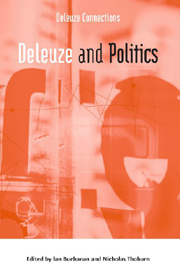Book contents
- Frontmatter
- Contents
- Dedication
- Acknowledgements
- Introduction: Deleuze and Politics
- 1 Power, Theory and Praxis
- 2 Deleuze and the Political Ontology of ‘The Friend’ (philos)
- 3 Molecular Revolutions: The Paradox of Politics in the Work of Gilles Deleuze
- 4 Schizoanalysis, Nomadology, Fascism
- 5 What is a Militant?
- 6 Bourgeois Thermodynamics
- 7 The Age of Cynicism: Deleuze and Guattari on the Production of Subjectivity in Capitalism
- 8 Deleuze, Materialism and Politics
- 9 Becoming-Democratic
- 10 Theorising European Ethnic Politics with Deleuze and Guattari
- 11 People and Fabulation
- 12 Micropolitical Associations
- Notes on Contributors
- Index
8 - Deleuze, Materialism and Politics
Published online by Cambridge University Press: 12 September 2012
- Frontmatter
- Contents
- Dedication
- Acknowledgements
- Introduction: Deleuze and Politics
- 1 Power, Theory and Praxis
- 2 Deleuze and the Political Ontology of ‘The Friend’ (philos)
- 3 Molecular Revolutions: The Paradox of Politics in the Work of Gilles Deleuze
- 4 Schizoanalysis, Nomadology, Fascism
- 5 What is a Militant?
- 6 Bourgeois Thermodynamics
- 7 The Age of Cynicism: Deleuze and Guattari on the Production of Subjectivity in Capitalism
- 8 Deleuze, Materialism and Politics
- 9 Becoming-Democratic
- 10 Theorising European Ethnic Politics with Deleuze and Guattari
- 11 People and Fabulation
- 12 Micropolitical Associations
- Notes on Contributors
- Index
Summary
For most of their history leftist and progressive politics were securely anchored on a materialist philosophy. The goal of improving the material conditions of workers' daily lives, of securing women's rights to control their bodies, of avoiding famines and epidemics among the poor: all of these were worthy goals presupposing the existence of an objective world in which suffering, exploitation and exclusion needed to be changed by equally objective interventions in reality. To be sure there was room in this materialism for the role of subjective beliefs and desires, including those that tended to obscure the objective interests of those whose lives needed improvement, but these were never allowed to define what reality is. The concept of ‘ideology’ may be inadequate for analy – sing these beliefs and desires, but it nevertheless captured the fact that there is a material reality with respect to which these subjective states should be compared.
Then everything changed. Idealism, the ontological stance according to which the world is a product of our minds, went from being a deeply conservative position to become the norm in many academic departments and critical journals: cultural anthropologists came to believe that defending the rights of indigenous people implied adopting linguistic idealism and the epistemological relativism that goes with it; sociologists, both social constructivist and ethnomethodologist, correctly denounced the concept of a harmonious society espoused by their functionalist predecessors only to embrace an idealist phenomenology; and many academic departments, particularly those that attach the label ‘studies’ to their name, completely forgot about material life and concentrated instead on textual hermeneutics.
- Type
- Chapter
- Information
- Deleuze and Politics , pp. 160 - 177Publisher: Edinburgh University PressPrint publication year: 2008



